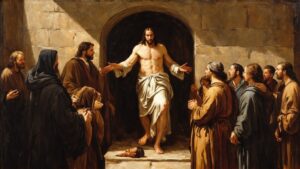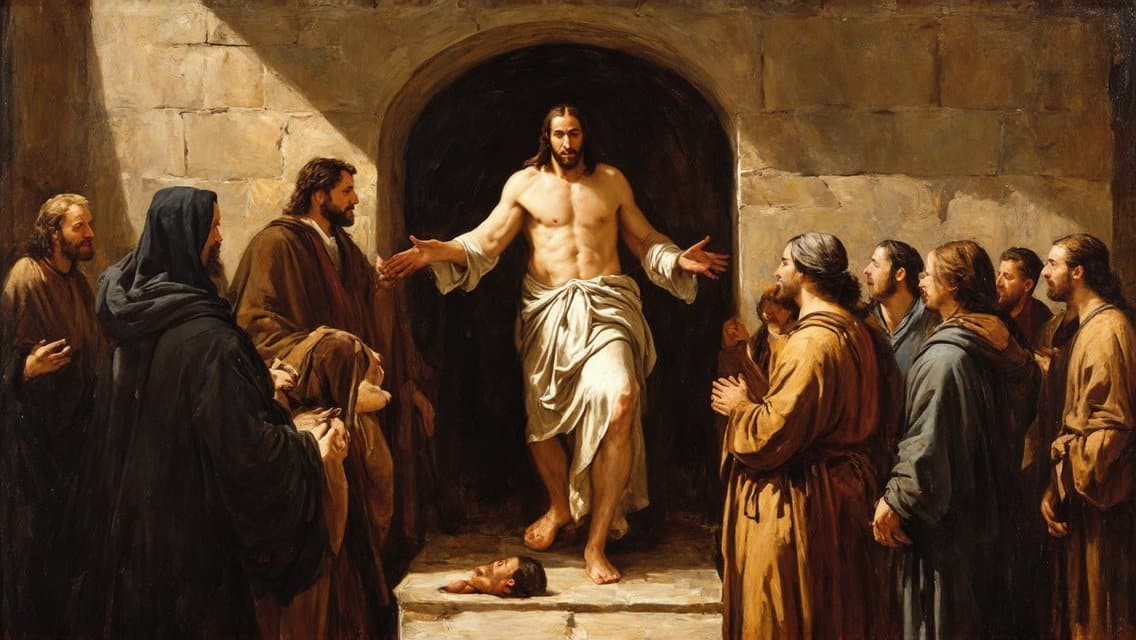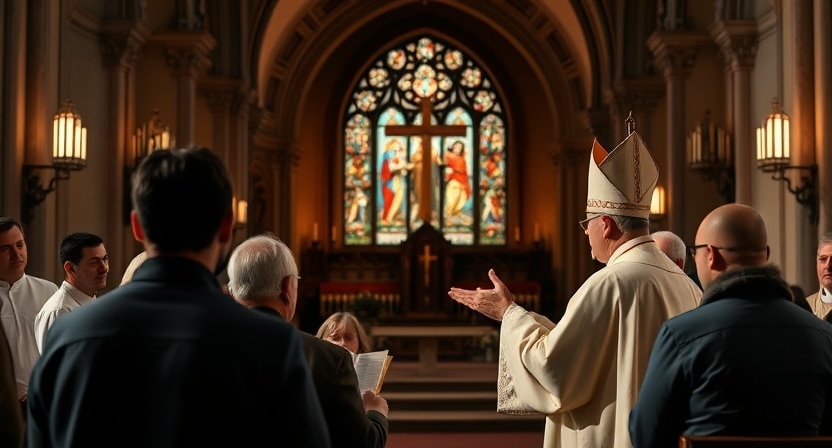FIFTH SUNDAY OF LENT
Christ the resurrection and the life
INTRODUCTION AND CONFITEOR
In today’s Gospel we see a scene which is all too common in our own world – people weeping over the death of a loved one. Jesus is at the heart of this sad scene, for it is his good friend Lazarus who is dead.
In the midst of the darkness Jesus shines the light of hope. He tells Lazarus’ sisters that those who believe in him never really die. He says the same to us. Let us pause for a moment to think about this great message of hope. [Pause]
The only death a Christian need fear is the death of sin. Let us ask Christ to raise us up from our sins. You raise the dead to life in the Spirit. Lord, have mercy.
You bring pardon and peace to the sinner. Christ, have mercy.
You bring light to those who live in darkness and in the shadow of death. Lord, have mercy.
HEADINGS FOR READINGS
First Reading (Ezekiel 37:12-14). The exile of the people to Babylon is described in terms of death. And their return home is described in terms of resurrection and spiritual renewal.
Second Reading (Romans 8:8-11). It was the Spirit who raised Jesus from the dead. Now this same Spirit lives in us. Therefore, we have no need to be afraid of death.
Gospel (John 11:1-45). By raising his friend Lazarus from the dead, Jesus shows that he is Lord of life and death.
1st Reading – Ezekiel 37:12-14
12 Thus says the Lord GOD: O my people, I will open your graves and have you rise from them, and bring you back to the land of Israel.
13 Then you shall know that I am the LORD, when I open your graves and have you rise from them, O my people!
14 I will put my spirit in you that you may live, and I will settle you upon your land; thus you shall know that I am the LORD. I have promised, and I will do it, says the LORD.
Responsorial Psalm – Psalms 130:1-2, 3-4, 5-6, 7-8
R. (7) With the Lord there is mercy and fullness of redemption.
1 Out of the depths I cry to you, O LORD;
LORD, hear my voice!
2 Let your ears be attentive
to my voice in supplication.
R. With the Lord there is mercy and fullness of redemption.
3 If you, O LORD, mark iniquities,
LORD, who can stand?
4 But with you is forgiveness,
that you may be revered.
R. With the Lord there is mercy and fullness of redemption.
5 I trust in the LORD;
my soul trusts in his word.
6 More than sentinels wait for the dawn,
let Israel wait for the LORD.
R. With the Lord there is mercy and fullness of redemption.
7 For with the LORD is kindness
and with him is plenteous redemption;
8 And he will redeem Israel
from all their iniquities.
R. With the Lord there is mercy and fullness of redemption.
2nd Reading – Romans 8:8-11
Brothers and sisters:
8 Those who are in the flesh cannot please God.
9 But you are not in the flesh; on the contrary, you are in the spirit, if only the Spirit of God dwells in you. Whoever does not have the Spirit of Christ does not belong to him.
10 But if Christ is in you, although the body is dead because of sin, the spirit is alive because of righteousness.
11 If the Spirit of the one who raised Jesus from the dead dwells in you, the one who raised Christ from the dead will give life to your mortal bodies also, through his Spirit dwelling in you.
Verse Before The Gospel – John 11:25A, 26
25A I am the resurrection and the life, says the Lord;
26 whoever believes in me, even if he dies, will never die.
Gospel – John 11:1-45
1 Now a man was ill, Lazarus from Bethany, the village of Mary and her sister Martha.
2 Mary was the one who had anointed the Lord with perfumed oil and dried his feet with her hair; it was her brother Lazarus who was ill.
3 So the sisters sent word to him saying, “Master, the one you love is ill.”

4 When Jesus heard this he said, “This illness is not to end in death, but is for the glory of God, that the Son of God may be glorified through it.”
5 Now Jesus loved Martha and her sister and Lazarus.
6 So when he heard that he was ill, he remained for two days in the place where he was.
7 Then after this he said to his disciples, “Let us go back to Judea.”
8 The disciples said to him, “Rabbi, the Jews were just trying to stone you, and you want to go back there?”
9 Jesus answered, “Are there not twelve hours in a day? If one walks during the day, he does not stumble, because he sees the light of this world.
10 But if one walks at night, he stumbles, because the light is not in him.”
11 He said this, and then told them, “Our friend Lazarus is asleep, but I am going to awaken him.”
12 So the disciples said to him, “Master, if he is asleep, he will be saved.”
13 But Jesus was talking about his death, while they thought that he meant ordinary sleep.
14 So then Jesus said to them clearly, “Lazarus has died.
15 And I am glad for you that I was not there, that you may believe. Let us go to him.”
16 So Thomas, called Didymus, said to his fellow disciples, “Let us also go to die with him.”
17 When Jesus arrived, he found that Lazarus had already been in the tomb for four days.
18 Now Bethany was near Jerusalem, only about two miles away.
19 And many of the Jews had come to Martha and Mary to comfort them about their brother.
20 When Martha heard that Jesus was coming, she went to meet him; but Mary sat at home.
21 Martha said to Jesus, “Lord, if you had been here, my brother would not have died.
22 But even now I know that whatever you ask of God, God will give you.”
23 Jesus said to her, “Your brother will rise.”
24 Martha said to him, “I know he will rise, in the resurrection on the last day.”
25 Jesus told her, “I am the resurrection and the life; whoever believes in me, even if he dies, will live,
26 and everyone who lives and believes in me will never die. Do you believe this?”
27 She said to him, “Yes, Lord. I have come to believe that you are the Christ, the Son of God, the one who is coming into the world.”
28 When she had said this, she went and called her sister Mary secretly, saying, “The teacher is here and is asking for you.”
29 As soon as she heard this, she rose quickly and went to him.
30 For Jesus had not yet come into the village, but was still where Martha had met him.
31 So when the Jews who were with her in the house comforting her saw Mary get up quickly and go out, they followed her, presuming that she was going to the tomb to weep there.
32 When Mary came to where Jesus was and saw him, she fell at his feet and said to him, “Lord, if you had been here, my brother would not have died.”
33 When Jesus saw her weeping and the Jews who had come with her weeping, he became perturbed and deeply troubled,
34 and said, “Where have you laid him?” They said to him, “Sir, come and see.”
35 And Jesus wept.
36 So the Jews said, “See how he loved him.”
37 But some of them said, “Could not the one who opened the eyes of the blind man have done something so that this man would not have died?”
38 So Jesus, perturbed again, came to the tomb. It was a cave, and a stone lay across it.
39 Jesus said, “Take away the stone.” Martha, the dead man’s sister, said to him, “Lord, by now there will be a stench; he has been dead for four days.”
40 Jesus said to her, “Did I not tell you that if you believe you will see the glory of God?”
41 So they took away the stone. And Jesus raised his eyes and said, “Father, I thank you for hearing me.
42 I know that you always hear me; but because of the crowd here I have said this, that they may believe that you sent me.”
HOMILY
The most astounding part of today’s extraordinary Gospel story is the picture of Jesus weeping for his dead friend, Lazarus. And yet, what sight is so commonplace and natural. It is natural, right, and healthy that we should grieve when death robs us of a friend. There are stages that people go through in grieving, even though they may be completely unaware of them. It is helpful to know about these stages. It will help us to cope with our own grief, and it will help us to understand and support others in their grief.
The Moran family consisted of father, mother, and three children. At the back of their house stood an ash tree. Though not young, it appeared to be in excellent health. It provided a delightful play-ground for the children. In winter it protected the house from storms. In summer it provided cool shade from the burning sun.
Still, because of its closeness to them, the members of the family took it very much for granted. Then one bleak winter’s night, a vicious storm blew up. In the middle of the night a horrendous crash was heard. Mrs. Moran thought it was some neighbouring tree, never imagining for one moment that it could be the ash tree. But in the morning she discovered to her horror that the seemingly secure tree had fallen.
She couldn’t believe it. She was devastated. Her neighbours found her wandering around the garden in a state of deep shock. The children were introduced to the horror. They thought of the games that were over for ever. Mrs. Moran thought of the shelter and shade, and wondered how she would manage without the tree.
Finally she got the courage to approach the fallen tree. Then she noticed that it was almost hollow inside. This undoubtedly accounted for its sudden collapse. She also noticed that the tree, though clearly dying, was not yet quite dead. A few roots were still intact. Thanks to these the tree clung to life, and Mrs. Moran clung to a forlorn hope.
Days passed. She tried to distract herself with the housework. But every time she stepped outside the house, the huge gap left by the tree was staring her in the face, and an overwhelming feeling of emptiness would assail her.
The weather turned nasty. Without the tree to protect it, the house was completely exposed to the biting wind and piercing rain. How cruel of nature, Mrs. Moran thought, to rob us of protection right in the middle of winter. Then she looked around and saw that the ash tree was apparently the only victim of the storm. This made matters worse. ‘Why didn’t the storm bring down one of those other useless trees, and spare our tree which was not only useful but beautiful as well?’
Soon another feeling began to torment her. We saw that the tree was rotten inside. Mrs. Moran now said: ‘I should have been able to see it. If only I had noticed it, then perhaps I could have got it some treatment, and it might have been saved’. She also felt bad about the fact that, though the tree had been there for many years, she had never fully appreciated it.
Finally spring arrived. It went round among all the neighbouring trees, whispering to them that it was time to awake from sleep. All but the ash tree responded. Then at last Mrs Moran knew that it was dead, and gave permission for it to be removed. When the removal was done, the full tragedy finally came home to her. The tree was gone, gone for ever from the face of the earth. But then another feeling invaded her soul like a balm. It was a feeling of deep gratitude. Later she said to her children: ‘We have been privileged. Not another house had a tree like our ash tree’.
She left the spot vacant. But the gap no longer reminded her merely of what she had lost but of her privileged state. Thus at last she was able to let go of it in peace. And finally spring came for the Morans too.
This story contains most of the stages of grieving: denial, shock, feeling of emptiness and anguish, anger, guilt, and finally acceptance. But today’s Gospel is not only about grieving. It is above all about faith and hope. The key passage is where Jesus says: ‘I am the resurrection and the life. If anyone believes in me, he will never die’. How often we hear these words at funeral services. But do we really hear them and believe them? They are the most important words in today’s Gospel.
Even after the raising of Lazarus, the apostles found it hard to believe these words. It wasn’t until Jesus died and rose again that they finally believed them. It is the resurrection of Jesus that sustains our hope that we can overcome death. Otherwise, the Good News is only a mirage.
Even with this faith, death still provides the greatest test for our faith. To believe, in spite of all evidence to the contrary, that there is in us a divine spark which even death cannot extinguish – this is the challenge our faith has to meet.
How the world today needs to hear the words of Christ. We live in a world where death is more talked about than life. It is a world dominated by death. For those who believe in Christ, the tears still fall when a friend or relative dies. Yet we are not overwhelmed. We flee to the Gospel, and our faith in Christ sustains us. We are like people who feel sad at the onset of autumn when the world turns bare and empty, in spite of their sure belief that spring will renew everything once more.
Christ went through death and emerged victorious. He is the first among. us to rise from the dead. He promises us a share in his victory. For us eternal life is not something that begins when we die. It begins the moment we hear the voice of Christ and believe in him. Thus, even in the midst of winter, we know that spring is already quietly at work, though its full blossoming is still in the future.
‘Fear not that your life will come to an end ; rather fear that it may never have begun’. (Thoreau)
‘He who truly loves life, and lives it, is able to accept death without sorrow’. (Rumi)
PRAYER OF THE FAITHFUL
Let us pray that Jesus, the Lord of life and death, may keep us rooted in a love which overcomes death and casts out all fear. R. Lord, hear .our prayer.
For the Church: that it may never tire in announcing to all people the good news of eternal life won for us by Christ. [Pause] We pray to the Lord.
For all our political leaders: that they may facilitate the work of those engaged in caring for and in preserving life. [Pause]\/ We pray to the Lord.
For all those who are saddened by the death of a dear one: that the words of Christ may bring them peace and consolation. [Pause] We pray to the Lord.
That we may believe ever more firmly that, as we journey through life, we are journeying with Christ and with each other towards the promised land of eternal life. [Pause] We pray to the Lord.
For our departed relatives and friends: that we may not grieve for them as people who have no hope. They have gone to heaven to see. to know, to worship, to love, and to intercede {or us [Pause] We pray to the Lord.
For local needs.
Let us pray:
God our Father, you sent your only Son into our world, a world dominated by death, to plant within our hearts the hope of eternal life. Grant that one day we may see this hope fulfilled. We ask this through the same Christ our Lord.
COMMUNION REFLECTION
I believe in death.
I believe that it is part of life.
I believe that we are born to die,
to die that we may live more fully;
born to die a little each day
to selfishness,
to pretence,
and to sin.
I believe that every time we pass
from one stage of life to another,
something in us dies
and something new is born.
I believe we taste death
in moments of loneliness and rejection,
in moments of sorrow and disappointment,
when we are afraid, lose courage, and give up,
when we see our dreams broken,
and every time we say goodbye.
I believe, too, that we are dying before our time
when we live in bitterness,
in hatred,
and in isolation.
I believe that each day
we are creating our own death
by the way we live.
To those who believe in Christ,
death is a gateway,
a gateway to eternal life.


